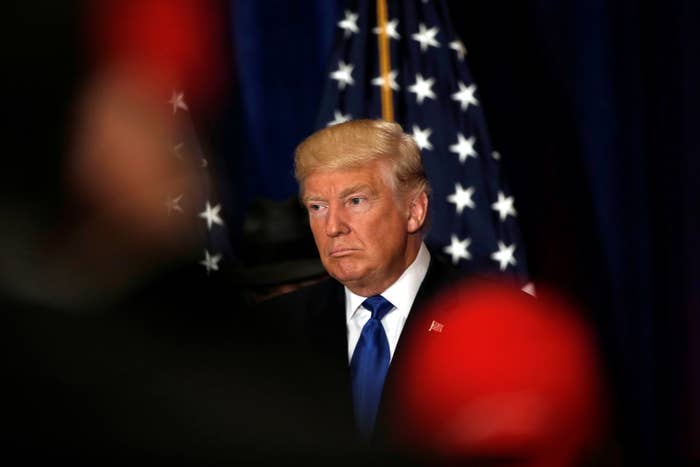
In the five years since Donald Trump first launched his birther crusade, he has had plenty of reasons — and opportunities — to disavow the conspiracy theory and apologize for championing it. Yet, even now, 52 days from a presidential election that he could conceivably win, the Republican nominee can’t quite bring himself to fully let go.
The reason: Trump isn’t just unrepentant of his birther history — he is unabashedly proud of it.
In a long career of self-serving publicity stunts, Trump considers his notorious birther turn in 2011 to be one of his most brilliant and bankable — a masterstroke of media manipulation that catapulted him into political stardom, marshaled a movement of new right-wing super-fans, and even forced a response from the commander-in-chief.
On Friday, even when he admitted that President Obama was born in United States, he claimed victory — and certainly didn’t apologize.
For Trump, truth was always somewhat beside the point when it came to birtherism. As his former adviser Sam Nunberg told the New York Times earlier this year, “The appeal of the birther issue was, ‘I’m going to take [Obama] on, and I’m going to beat him. It was a great niche and wedge issue.”
Trump, a proud connoisseur of crazy talk, didn’t fully commit to the birther canard at first. For several weeks in early 2011, he publicly flirted with the fringe idea, as though testing its potency. A vague mention of Obama’s supposedly mysterious childhood drew loud cheers at CPAC that year. A Good Morning America interview in which he admitted to having “a little doubt, just a little” about the president’s true nationality sent the press into a tizzy.
When, in April 2011, Obama released his long-form birth certificate — thoroughly debunking the conspiracy theory and exposing its champions as either loons or con artists — Trump was entirely unchastened. In fact, he celebrated the presidential attention as a momentous victory, the kind that grants one permission to speak in third person. “He only did it because of Trump!” he gloated.
Trump’s birther crusade sent him rocketing up the pre-2012 primary polls, and made him a hero to an ascendant wing of the Republican Party. As a matter of political history, few would now dispute that it laid the foundation on which he built his successful bid for this year’s GOP nomination. In the cynical win/loss column of Trump’s life, there’s little question about where this episode belongs. So, why on earth would he apologize for it now?
Of course, contrary to the narrative that the Trump campaign is now spinning, he did not drop the issue in 2011. In truth, he went on banging the birther drum for years — on TV, in speeches, and in countless press interviews. When I sat down with him in early 2014, he spent a considerable portion of the time laying out his latest theories about the president’s birth certificate. For a while, there was nothing I could do to get him off the subject.
His stubborn loyalty to the fully-quashed conspiracy theory long after it stopped serving his purposes might speak to his genuine belief in it. More likely, it reflects one of Trump’s most unwavering characteristics: a staunch refusal to ever give his critics the last word.
As effective as Trump’s birtherism was in building a conservative grassroots fan base, it did not come without social costs. The first time he went full-bore birther, during a 2011 appearance on The View, he endured an indignant chorus of crosstalk from the co-hosts, who were outraged by his attempts to delegitimize America’s first black president. Even his good friend Whoopi Goldberg declined to come to his rescue, telling him, “I think that’s the biggest pile of dog mess I’ve heard in ages.”
Trump’s chief retort to the ladies of The View was more tribal than rational. “Let me just tell you,” Trump said, “I was a really good student at the best school. I’m, like, a smart guy, OK? They make these birthers into the worst idiots.”
The longer he championed the birther movement, the more radioactive he became to his celebrity pals. David Letterman berated Trump on air, and mused about banning him from the show. Jerry Seinfeld cancelled a scheduled appearance at an Eric Trump Foundation benefit, with a rep explaining that the comedian had grown “increasingly uncomfortable” with Trump’s “demagoguery.”
The pile-on of public ridicule reached its climax at the 2011 White House Correspondents Dinner, where the night’s most memorable punchlines all seemed to come at the Donald’s expense.
In the end, Trump thrived not only by championing the birther cause, but the birthers themselves — stoking the flames of white grievance and victimization, reminding his fellow Obama-hating conspiracy theorists at every opportunity that the political class was laughing at them, mocking them, calling them stupid. In Trump’s narrative, he — and his followers — got the last laugh when he stood on a stage in Cleveland and formally accepted the Republican presidential nomination. To disavow the movement that got him there now would be an unacceptable surrender to the haters.
